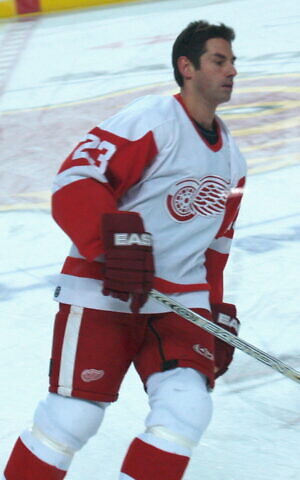Jewish Players No Longer Exception on NHL Rosters
“We’re probably looking at a record number of Jewish players in the league right now,” said Mathieu Schneider, arguably the most famous Jewish hockey player of all time.

Historically speaking, the NHL hasn’t exactly been regarded as the most diverse league in the sports world. Players from dozens of countries have been represented in its century-long existence, but unfortunately, the overwhelming majority of participants have been white Christian men.
Recently, however, there have been some encouraging developments, albeit on a fairly limited scale, suggesting that change may be forthcoming. Many NHL teams now have players who come from ethnic and racial minority communities and, as has been well documented, there is a record number of Jewish players this season.
In what has been a milestone year for the Jewish community in rinks across North America, the Pittsburgh Penguins, for the second straight year, are one of the precious few teams in NHL history to feature not one but two Jewish players on their active roster: veteran left-winger Jason Zucker and defenseman Mark Friedman. The unique pairing came to fruition last February when Pittsburgh, which had already acquired Zucker as a free agent in 2019, claimed Friedman after he was put on waivers by the Philadelphia Flyers.

While neither player has figured prominently in Pittsburgh’s emergence as a Stanley Cup contender — Zucker was a rock-steady presence for the Minnesota Wild last decade but appears to be past his prime, while Friedman has seen limited action as a fourth line blueliner since coming over from Philly — the fact that the Pens have been rolling out lineups featuring multiple Jewish players is noteworthy in and of itself.
“It’s a rare occurrence in hockey, there’s no question about that,” says Mathieu Schneider, arguably the most famous Jewish hockey player of all time, who now serves as a special assistant to NHLPA Executive Director Donald Fehr. “I played with Michael Cammalleri briefly [during the 2002-03 season], who’s Jewish as well. Although he didn’t really practice. His mom was Jewish. His dad was Italian.”
Zucker and Friedman, both of whom declined to be interviewed for this article, are practicing Jews: the former has grown accustomed to doing virtual menorah lightings with his Las Vegas-based family when he is on road trips, while the latter grew up in Toronto and attended Hebrew school until grade five.
Zucker’s upbringing in Las Vegas is relevant to the discussion here. Since the NHL began gaining a prominent foothold in the Sun Belt in the early 1990s, there have been quite a few players born and raised in warm weather regions breaking into the NHL. Naturally, with the league becoming more geographically diverse, the pool of participants, and their respective backgrounds, has widened.

“There are more kids playing our game so you’re going to get more minorities and cast a larger net,” adds Schneider, who played for 10 NHL teams, including the Atlanta Thrashers during the 2008-09 season, and represented the United States in two Olympics (the Nagano Games in ’98 and the Torino Games eight years later). “The goal has always been that we want to make the game more accessible to more people.”
But for young Jews who observe the mitzvot, the time demands intrinsic to the game of hockey will always be daunting. Whether it’s getting up at 4:00 a.m. on a Saturday to rush over to the rink or catching a Friday night plane for a weekend tournament in Michigan, the sport does not readily lend itself to free time for Hebrew school or bar mitzvah preparation, let alone regular school academics.
For this reason alone, the inclusion of more and more Jews on NHL rosters and multiple Jewish skaters representing the same team are developments worthy of celebration.
“We’re probably looking at a record number of Jewish players in the league right now,” acknowledges Schneider, who, while playing for the New York Islanders in the mid-’90s, once lit the world’s largest menorah. “It’s certainly inspirational for a lot of kids who are playing the game. It’s an interesting time. We’re going to have to form some kind of club or something.”
While any such club would be headlined by Jack and Quinn Hughes, Adam Fox and Zach Hyman, a quick Google search indicates that Zucker is, by far, the longest-tenured Jewish NHL player currently in the league. Since his debut in 2011, Zucker, who recently celebrated his 30th birthday, has tallied 286 points, including 153 goals.
“I’m sure he [Zucker] is very proud of his career and he should be,” says Schneider. “From what I know about him, he is a great teammate.”
Schneider should know. He was considered the consummate teammate during his NHL career, which began when Ronald Reagan was in office and ended when Barack Obama was president. As such, the fact that he was one of the game’s few Jewish players was hardly a topic of conversation in NHL dressing rooms — something he believes should be the case for Zucker, Friedman and others who identify with Judaism.
“In all honesty, over my 20 years, there were a couple different instances [of anti-Semitism],” Schneider admits. “But the one thing I always felt in the dressing room was that if you were a good teammate, it didn’t matter what religion you were, what your background was. There are always exceptions, there’s no question about it. [But] if you were contributing and you were a good teammate you were welcome in an NHL dressing room.”
- Sports
- Local
- David Ostrowsky
- Philadelphia Flyers
- Mark Friedman
- Jason Zucker
- Pittsburgh Penguins
- Stanley Cup championship
- white Christian men
- Jewish players
- Stanley Cup contender
- Minnesota Wild
- Mathieu Schneider
- Jewish hockey player
- NHLPA Donald Fehr
- Michael Cammalleri
- Toronto
- virtual menorah lightings
- hebrew school
- Atlanta Thrashers
- United States
- Olympics
- Nagano Games
- Torino Games
- bar mitzvah preparation
- school academics
- New York Islanders
- Jack Hughes
- Quinn Hughes
- Adam Fox
- Zach Hyman
- Judaism
- Anti-Semitism
- President Barack Obama
- President Ronald Reagan



comments